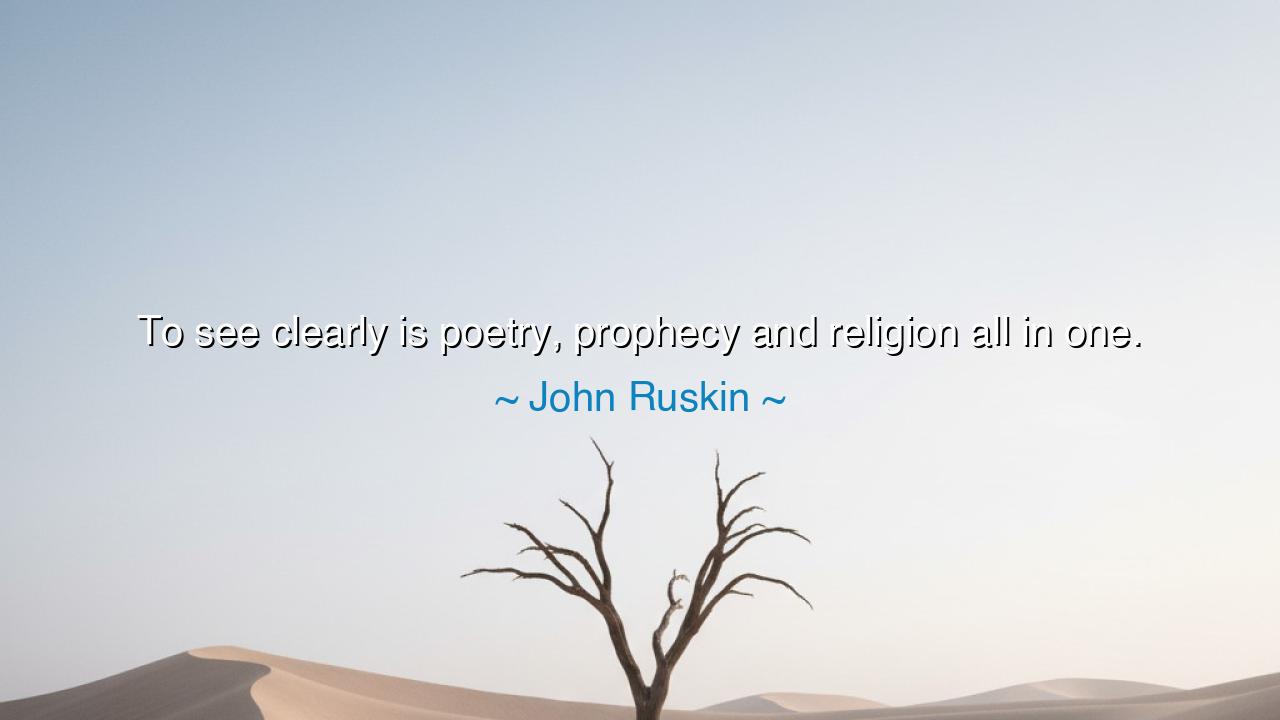
To see clearly is poetry, prophecy and religion all in one.






John Ruskin, the fiery critic and seer of the nineteenth century, once declared: “To see clearly is poetry, prophecy and religion all in one.” These words carry the weight of a vision that transcends mere intellect. For what does it mean to see clearly? It is not only to open the eyes of the body but to awaken the eyes of the soul—to pierce through fog, illusion, and vanity, and to behold truth as it is. In this act of true seeing, Ruskin tells us, one finds the three highest forms of human experience: the beauty of poetry, the foresight of prophecy, and the reverence of religion.
The ancients, too, taught that true vision was the mark of greatness. In Greece, the poet was believed to be inspired by the Muses, granted sight beyond ordinary men. The prophet was the one who read the signs of heaven and fate. And the priest or mystic was the one who saw through the veil of the material into the eternal. Ruskin gathers these together into one simple truth: when the heart and mind perceive reality without distortion, when we see with purity, then we are poet, prophet, and priest all at once. Clarity is no small gift—it is divine.
Consider the story of Galileo Galilei. With his telescope he looked to the heavens and saw what others refused to see: the moons circling Jupiter, the shadows of mountains on the moon, the dance of planets that disproved old dogmas. In this clear sight, he was poet—speaking of the wonder of the cosmos; prophet—foretelling a new age of science; and, in a sense, priest—revealing the hidden order of creation. His vision was resisted, condemned, even silenced, yet truth could not be denied. He saw clearly, and thus fulfilled Ruskin’s triad: poetry, prophecy, and religion in one.
Ruskin himself lived in an age of smoke and speed, when factories darkened the skies of England and men praised machines more than mountains. Yet he urged his readers to see clearly the beauty of nature, the dignity of honest work, the sacredness of art. He warned that without clear sight, society would drown in greed and ugliness. His words still thunder today: clarity is not only for the artist, but for the citizen, the leader, the soul who wishes to live rightly in a chaotic world.
There is also a heroic challenge hidden in this teaching. For to see clearly is not easy. It requires courage, because the truth is often uncomfortable. It requires discipline, because the eyes are easily clouded by desire and fear. And it requires humility, because the seer must admit that his previous vision was incomplete. Yet, those who dare to seek clarity find themselves transformed: they become creators of beauty, bearers of warning, and keepers of the sacred.
So what is the lesson for us, children of tomorrow? It is this: cultivate the art of clear sight. Do not be deceived by glitter or noise. Look beneath appearances to the essence of things. See the beauty where others pass blindly. See the danger where others are lulled by comfort. See the divine in the ordinary. In this way, your vision will be more than seeing—it will be poetry, prophecy, and religion together.
Practical actions follow. Practice attentiveness: when you walk, truly see the sky, the trees, the faces around you. When you read, do not skim—look for the truths that lie beneath the words. When you face injustice, do not turn away—see it clearly, and act. When you encounter beauty, let it strike you with reverence, as if you were before an altar. In these small acts, you will train the inner eye to clarity.
Thus Ruskin’s words are no mere definition, but a call to arms: to see clearly is to live deeply, to honor beauty, to warn against danger, and to walk with reverence in the world. It is to become at once poet, prophet, and priest. And if you dare to cultivate such sight, you will not only see the truth—you will live it.






MTMy Tra
Ruskin’s statement is powerful, but it also makes me curious about the relationship between perception and truth. If ‘seeing clearly’ is associated with poetry, prophecy, and religion, does that mean that all these areas seek to reveal some deeper truth or meaning? Can this clarity be achieved, or is it something that remains elusive, something we continually strive for in our art, our beliefs, and our understanding of the world?
THnguyen thi thanh hoa
This quote from Ruskin seems to elevate clarity to almost a mystical level. It raises the question: can we ever truly ‘see clearly’ in the way Ruskin describes, or are we always interpreting through personal biases and experiences? What does it mean to have a clear vision in art, life, or even in spiritual practice? Does it imply a higher truth, or is it more about the power of perception and perspective?
BLvu bich lien
I find it intriguing how Ruskin connects the act of seeing clearly to something as vast as poetry, prophecy, and religion. It makes me wonder: is the ability to see truly universal across different areas of life, or does it take on different forms depending on one’s perspective? Can we equate artistic vision with prophetic insight, or does one require a different kind of ‘clarity’ or understanding of the world?
CPChi PhuongPro
Ruskin's quote seems to suggest that clarity of vision—whether literal or metaphorical—holds a profound power, one that intertwines art, foresight, and spirituality. But does seeing clearly truly encompass all these elements? Can an artist or visionary truly gain insight in the same way a prophet or religious figure might, or is Ruskin blending these concepts to show the significance of perception in different domains? Is ‘seeing clearly’ a gift or a learned skill?